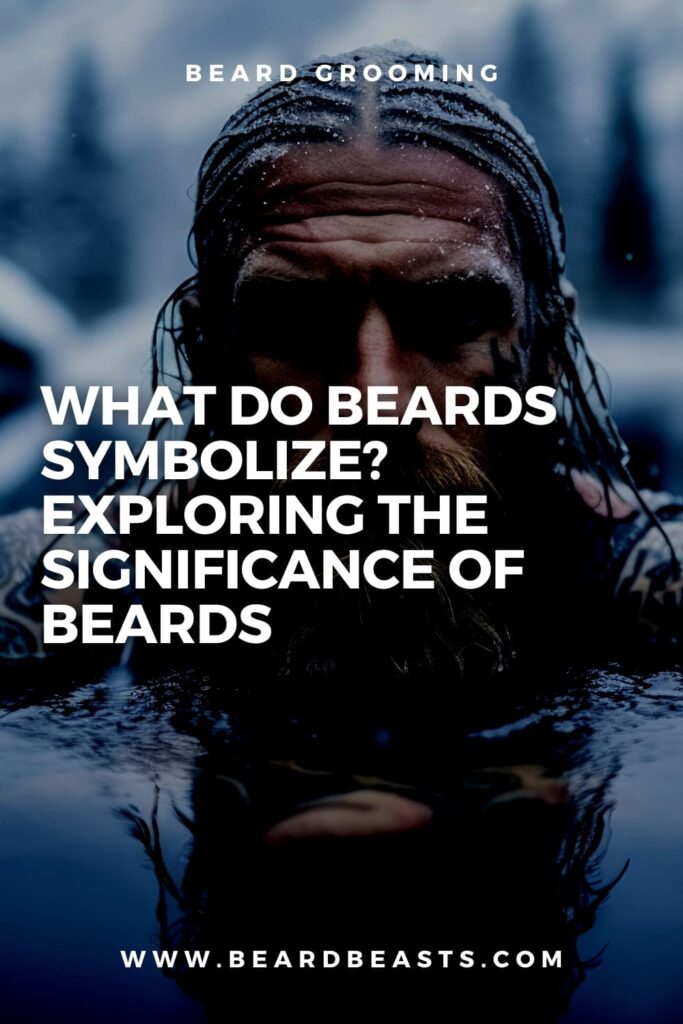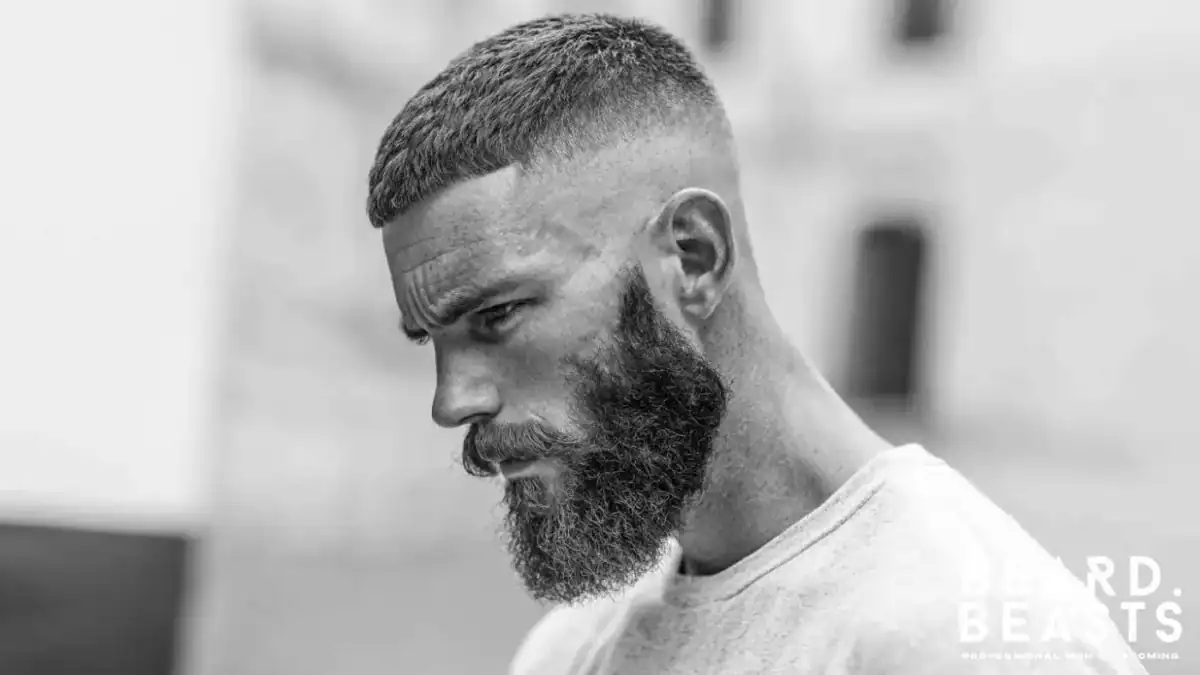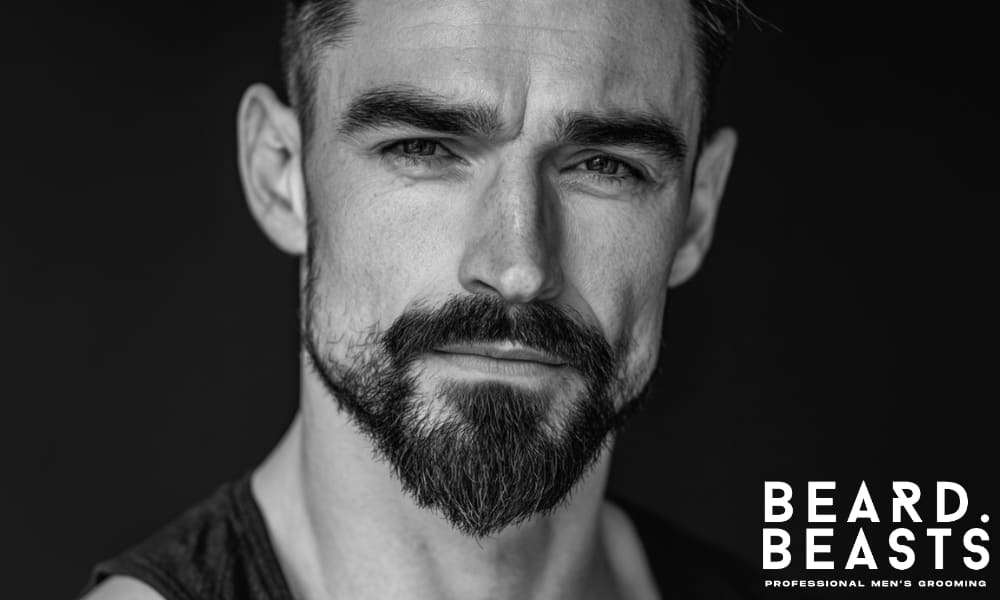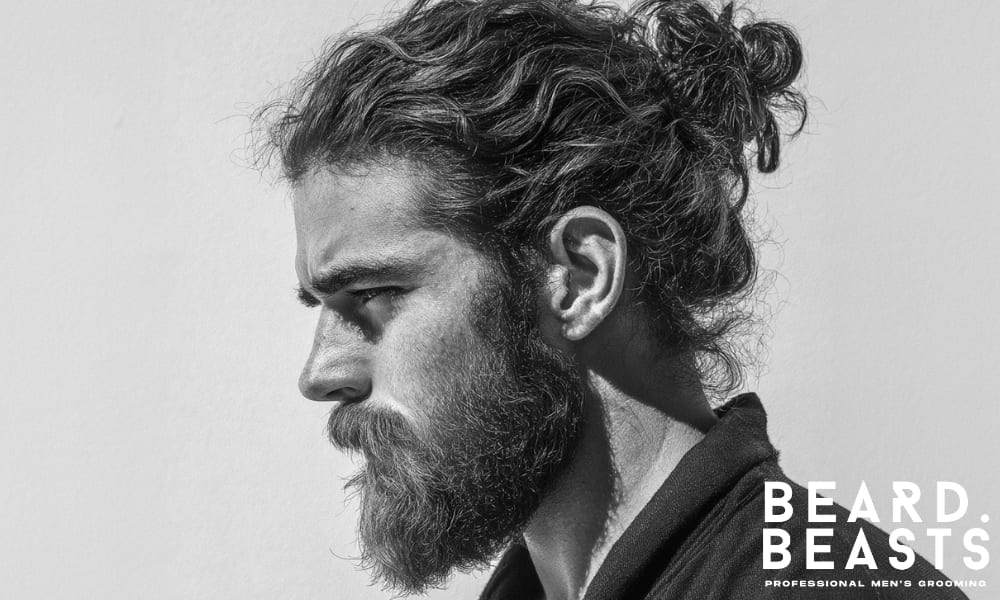Beards – they’re not just a trend, they’re a tale as old as time. Throughout history, they’ve adorned the faces of kings, warriors, and philosophers alike, turning ordinary men into icons of power and wisdom. But have you ever stopped to wonder, “What do beards symbolize?” This age-old question goes beyond mere facial hair. It’s about the stories and secrets hidden within those tangled threads.
Beards are more than just a fashion statement or a sign of age. They are a canvas, painting a picture of a person’s cultural heritage, beliefs, and personal journey. In some cultures, a beard is a rite of passage, a symbol of coming into one’s own. In others, it’s a sacred emblem, woven with spiritual significance. From the boardrooms to the backstreets, beards carry with them an aura of mystery and power.
Understanding the symbolism of beards opens up a world of insight into human nature and societal norms. It tells us about the unspoken language of masculinity, respect, and identity. Whether it’s the neatly trimmed beard of a corporate CEO or the wild, untamed mane of a mountain hermit, each style speaks volumes about the individual and their place in society.
In this journey through the world of beards, we’ll explore how these symbols of strength and wisdom have evolved over time. From the ancient warriors who saw their beards as a token of valor to the modern man who views it as a statement of style and individuality, the significance of beards is as diverse as the people who wear them. So, buckle up, as we delve deep into the heart of what beards symbolize, unraveling the mystique strand by strand.
Historical Perspective: The Evolution of Beard Symbolism
Journey back to the dawn of civilization, and you’ll find that beards were more than just facial hair; they were emblems of honor, wisdom, and power. In ancient Egypt, beards were so revered that even pharaohs wore fake ones made of gold during important ceremonies, symbolizing their divine status. The Mesopotamians, on the other hand, viewed beards as a sign of dignity and sculpted them elaborately, as seen in their majestic statues.
In ancient Greece, beards were a mark of manhood and intellect. Philosophers like Socrates and Plato sported beards to signify wisdom and maturity. The Greeks believed that a beard connected a man to his inner strength, making it a crucial aspect of their identity. This belief was so ingrained that Alexander the Great’s decision to shave was seen as a revolutionary act, symbolizing a break from the old ways and an embrace of a new, strategic approach to warfare.
Beards in Medieval and Modern Times
Fast forward to medieval times, and the symbolism of beards took on new dimensions. In Europe, beards became associated with knights and warriors, a sign of virility and bravery. Kings and noblemen often grew full beards to assert their authority and command respect among their peers and subjects.
However, as we stepped into the modern era, the perception of beards underwent a dramatic shift. The 18th and 19th centuries saw a decline in beard popularity, as a clean-shaven look became synonymous with sophistication and cleanliness, influenced by the changing dynamics of society and the advent of new shaving tools.
The 20th century brought another turn in the tale of beards. With the counterculture movements of the 1960s and 70s, beards re-emerged as symbols of rebellion and freedom. This era witnessed a beard renaissance, where facial hair became a canvas for self-expression, a way for individuals to set themselves apart from mainstream norms.
Today, the question, What do beards symbolize? garners diverse answers. In the contemporary world, beards symbolize everything from fashion sense to a connection with one’s roots. The modern man views his beard as a blend of traditional masculinity and personal style. Celebrities, sports stars, and influencers have embraced beards, each adding their own twist to this timeless symbol.
In summary, the evolution of beard symbolism from ancient civilizations to modern times reflects the ever-changing tides of cultural values and personal expression. Once seen as a badge of honor and wisdom, beards have journeyed through history, embodying various meanings and emerging in the present day as versatile symbols of individuality and heritage. The story of beards is a fascinating glimpse into how something as simple as facial hair can weave such a complex tapestry of symbolism across the ages.
Cultural Significance: Beards Across the World
When we explore the world through the lens of beards, we discover a rich tapestry of meanings and beliefs. Every culture has its unique interpretation of what beards symbolize, turning this natural feature into a powerful cultural statement.
In the Middle East, beards are often seen as a symbol of wisdom and respect. In many countries, a full beard is associated with maturity, dignity, and masculinity. It’s not just about appearance; it’s about embodying the qualities of a wise, experienced man. The beard is so integral to some Middle Eastern cultures that it’s often considered a sign of honor.
Moving to the West, the perception shifts dramatically. In America and much of Europe, the beard has evolved into a symbol of individuality and non-conformity. Here, beards are less about tradition and more about personal expression. They can signify a rugged, outdoorsy lifestyle, or they might be groomed to perfection, reflecting a meticulous, fashion-forward attitude. The modern Western beard is a statement of personal style and self-expression.
Asia presents yet another view. In countries like India and China, beards historically symbolized wisdom and were often associated with sages and intellectuals. However, in modern times, this symbolism has faded somewhat, with beards more often seen as a fashion choice or a personal preference rather than a cultural emblem.
Beards in Religious Contexts
The symbolism of beards takes on even deeper dimensions in religious contexts. In many religions, beards are not just facial hair but are imbued with spiritual significance.
In Islam, the beard is highly regarded and is seen as a mark of piety and adherence to the Sunnah (the practices of the Prophet Muhammad). It’s a symbol of a Muslim man’s commitment to his faith and his respect for Islamic traditions.
In Sikhism, the beard holds immense religious significance. Sikhs believe in maintaining their natural form, and hence, cutting the hair is discouraged. The beard, in this context, is a sign of devotion to God and a symbol of the Sikh’s commitment to their faith.
In Orthodox Judaism, the beard is also of great importance. It’s considered a symbol of wisdom and respect. Many Jewish men grow their beards as a sign of reverence to the commandments and as an expression of their religious identity.
In Christianity, the significance of beards varies among different denominations. For instance, in Eastern Orthodox Christianity, beards are often seen as a mark of spiritual maturity and are worn by many priests and monks.
To sum up, beards are not just a global phenomenon; they’re a universal language, speaking volumes about cultural identity, personal beliefs, and religious devotion. From the deserts of the Middle East to the bustling cities of the West, and from the spiritual heartlands of India and China to the religious communities around the world, beards continue to be powerful symbols, telling stories of who we are and what we believe in. They remind us that even in our differences, there’s a shared thread of humanity that connects us all.
Psychological Implications: What Beards Say About You
When we dive into the realm of psychology, beards reveal fascinating insights about perceptions of masculinity and maturity. Growing facial hair can significantly change how others view a person and, more interestingly, how they view themselves.
For centuries, beards have been synonymous with masculinity. A thick, well-groomed beard is often perceived as a sign of robust masculinity. In many cultures, a beard is a visible indicator of a man’s transition from youth to adulthood. It’s not just about physical maturity; it’s seen as a symbol of emotional and psychological growth. When you see a man with a beard, there’s an unconscious association with qualities like strength, resilience, and decisiveness. This perception is so ingrained that, in many cases, men with beards are often considered more authoritative and commanding, especially in leadership roles.
The relationship between beards and masculinity extends into the realms of attraction and social dynamics. Studies have shown that people often perceive bearded men as more attractive, dominant, and socially mature. It’s as if the beard adds an extra layer of intrigue and depth to the personality, making the individual stand out.
Beards and Personal Identity
Beyond societal perceptions, beards play a crucial role in personal identity. In the modern world, where personal expression is highly valued, a beard can be a canvas for self-expression. It’s a way for individuals to make a statement about who they are and what they stand for.
For some, growing a beard is a journey of self-discovery. It can be an act of rebellion against societal norms or a way to reconnect with one’s roots and heritage. For others, it’s about embracing a lifestyle or aligning with a particular subculture. A well-groomed beard might signify meticulousness and attention to detail, while a wild, untamed beard could reflect a free-spirited, adventurous nature.
The psychological impact of beards extends to the wearer’s self-esteem and confidence. Many men report feeling more confident and self-assured with a beard. This boost in self-esteem is not just about external appearance; it’s about the sense of identity and individuality that comes with it.
In essence, when we ask, What do beards symbolize? we’re tapping into a deep psychological well. Beards transcend mere facial hair; they reflect our self-image and how we opt to present ourselves to the world. They tell a story of masculinity, maturity, and personal identity, woven together in the strands of each unique beard. In the grand tapestry of human expression, beards are a powerful thread, symbolizing the myriad ways we define and express ourselves.
Fashion and Trends: Beards in the Modern Era
In the world of fashion and trends, beards have made a remarkable comeback, becoming a staple of modern style. Gone are the days when beards were merely a result of not shaving. Today, they are a fashion statement, a way of life. This shift has given rise to a booming industry focused on beard grooming and styling, symbolizing a new era in men’s fashion.
The modern man treats his beard with the same care and attention as his wardrobe. From specialized beard oils and balms to bespoke trimming services, the art of beard maintenance has evolved into a sophisticated ritual. This transformation is not just about looking good; it’s about feeling good and taking pride in one’s appearance. The rise of beard grooming culture has made it clear that beards are not just an accessory but an integral part of a man’s personal style.
Barbershops have adapted to this trend, with many offering exclusive beard grooming services. These establishments are no longer just places for a haircut; they are sanctuaries for beard aficionados. Here, grooming a beard is not just a chore, but an experience – a testament to the cultural shift in how we perceive and care for our beards.
Influence of Celebrities and Fashion on Beard Trends
Celebrities and fashion icons have significantly influenced the resurgence of beards in the fashion world. Actors, sports stars, and musicians have embraced the beard, each adding their flair to it. When a famous personality sports a unique beard style, it often sets a new trend, inspiring millions to follow suit.
Social media has amplified this effect, with platforms like Instagram and Pinterest becoming hotbeds for beard trends. Here, influencers and fashion bloggers showcase a variety of styles, from the neatly trimmed to the ruggedly natural, influencing the beard grooming habits of their followers.
Designers and fashion brands have also recognized the appeal of beards, incorporating them into their aesthetics and runway shows. The beard has become a symbol of modern masculinity and sophistication, aligning with various fashion movements and styles.
In conclusion, the world of fashion and trends has embraced the beard, transforming it from a mere facial feature into a symbol of style and self-expression. The modern era has witnessed the rise of beard grooming and styling, influenced by celebrities and the fashion industry. Today, when we explore what beards symbolize, we find that they are not just about masculinity or maturity; they are a reflection of individuality, a statement of personal style, and an essential part of the contemporary fashion landscape.
Health and Science: The Benefits and Challenges of Having a Beard
When we ask, “What do beards symbolize?” we often overlook the scientific benefits they offer. Growing a beard is not just a style statement; it’s a decision that can positively impact your health in various ways:
- Skin Protection: Beards provide a natural layer of protection for your skin. They can significantly reduce exposure to harmful UV rays, one of the leading causes of skin cancer. This protective barrier also shields your face from the elements, like wind and cold, helping to prevent skin dryness and irritation.
- Natural Filtration: Sporting a beard may benefit your respiratory health. Beards act like a filter, capturing dust, pollen, and other airborne particles before they enter your respiratory system. This feature is particularly advantageous for people living in urban areas with high pollution levels.
- Moisture Retention: Facial hair helps in maintaining the natural moisture balance of the skin. Beards aid in trapping the skin’s natural oils, reducing the likelihood of dry and flaky skin, which is common in harsh weather conditions.
- Reduction in Acne: For those prone to acne, a beard might be a good solution. Shaving can irritate the skin and spread bacteria, contributing to acne. By reducing the need to shave frequently, beards can help in minimizing skin irritation and outbreaks of acne.
Common Challenges and How to Overcome Them
Despite these benefits, having a beard comes with its own set of challenges. Here’s how to address them effectively:
- Itchiness and Discomfort: It’s common to experience itchiness during the initial phase of growing a beard. To alleviate this, ensure regular cleaning and moisturizing of your beard. Products like beard oils and balms can soothe the skin and soften the beard hair.
- Maintaining Hygiene: Beards can trap food particles, dirt, and bacteria. To maintain a healthy beard, regular washing with a gentle beard cleanser is crucial. Additionally, thorough drying of the beard is essential to prevent fungal growth.
- Grooming and Styling: To keep your beard looking its best, invest in quality grooming tools such as quality beard trimmers and combs. Regular trimming helps maintain the shape of your beard and encourages healthy hair growth.
- Dandruff: Beard dandruff or ‘beardruff’ is a common issue. Regular exfoliation of the skin under your beard and using moisturizing beard oils can help keep the skin healthy and free from flakiness.
In summary, understanding the health benefits and challenges of having a beard adds depth to our understanding of what beards symbolize. Beyond their cultural and fashion significance, beards offer various health advantages. However, they also require a commitment to proper care and hygiene. As we explore the significance of beards, it’s clear they are not just a symbol of style or masculinity; they are also an expression of personal health and well-being.
Social Dynamics: Beards in the Workplace and Society
When pondering over What do beards symbolize? it’s essential to consider their role in professional settings. The modern workplace has seen a significant shift in how beards are perceived. Gone are the days when a clean-shaven face was the only acceptable look in the corporate world. Today, beards are increasingly common in professional environments, symbolizing a blend of sophistication and individuality.
In various sectors, from creative industries to corporate offices, beards are now seen as an extension of one’s professional persona. They can convey a sense of confidence and experience. In many cases, a well-groomed beard is perceived as a sign of being detail-oriented and dedicated to personal upkeep, qualities valued in any professional setting.
However, the acceptance of beards in the workplace isn’t universal. Some industries still prefer a more traditional, clean-shaven look, especially in roles that require strict hygiene standards or where a conservative appearance is the norm. The key in professional settings is grooming. A neatly trimmed and well-maintained beard often makes the difference in how facial hair is perceived in the workplace.
Social Perceptions and Biases Towards Beards
In the broader social context, beards evoke a variety of perceptions and, sometimes, biases. The symbolism of beards can vary greatly depending on cultural norms, personal beliefs, and even fashion trends. While some view beards as a sign of ruggedness and masculinity, others might associate them with wisdom and maturity.
However, it’s important to acknowledge that beards can also be subject to stereotypes and biases. In some cases, people unfairly link beards to negative traits such as aggressiveness or unprofessionalism. Such stereotypes are often baseless and can lead to misconceptions about individuals who choose to grow a beard.
To counter these biases, there’s a growing movement promoting beard positivity, highlighting the diversity and personal stories behind each beard. This movement aims to shift the narrative from stereotypes to a more inclusive understanding of beards as an expression of individuality and personal style.
In conclusion, beards in the workplace and society reflect a complex interplay of professionalism, personal expression, and societal norms. As we continue to explore what beards symbolize, it’s clear that they are more than just a fashion statement; they are a part of an individual’s identity and can influence social dynamics in various ways. By understanding and respecting the diverse meanings behind beards, we can appreciate their role not just in personal expression but also in shaping the fabric of our social and professional interactions.
FAQs: Common Questions About Beards
As we delve into the intriguing world of beards, many questions arise. Understanding what beards symbolize also means addressing common queries about them. Here are answers to some frequently asked questions about beards:
How long does it take to grow a beard?
- The time it takes to grow a beard varies from person to person, depending on genetics and health factors. On average, facial hair grows about half an inch per month. A full beard typically takes two to four months to grow.
What are the best ways to maintain a beard?
- Proper maintenance is key to a healthy beard. Regular washing with a gentle beard-specific shampoo, using beard oils or balms for moisture, and trimming to keep the desired shape are essential steps. Additionally, a balanced diet and staying hydrated contribute to healthier beard growth.
Can beards cause skin problems?
- If not properly maintained, beards can lead to skin issues like itchiness, dandruff, and acne. Keeping the beard clean, moisturized, and well-groomed usually prevents these problems. Those with sensitive skin should consider using hypoallergenic beard care products.
Do beards affect job prospects?
- This largely depends on the industry and company culture. In creative and tech industries, beards are generally more accepted. However, in more traditional fields, employers or individuals might still prefer a clean-shaven look. The key is to keep the beard well-groomed if you choose to have one in a professional setting.
Can everyone grow a beard?
- Genetics largely determine the ability to grow a beard. Some men may find it difficult to grow a full beard due to genetic factors, while others may grow thick beards effortlessly. Age and health also play a role in beard growth.
How do beards impact perception in social settings?
- Beards can influence how people are perceived in various ways. They can be seen as signs of maturity, wisdom, or ruggedness. However, perceptions can vary based on personal and cultural preferences. A well-groomed beard is usually more positively received.
Does shaving make the beard grow thicker?
- This is a common myth. Shaving does not affect the thickness or rate of hair growth. Hair may appear thicker after shaving because it grows back with a blunt tip, but the growth pattern remains unchanged.
Are there benefits to having a beard?
- Yes, beards can offer benefits like skin protection from UV rays, retaining facial moisture, and even possibly reducing the likelihood of bacterial infections. They also serve as a form of self-expression and personal style.
In exploring these FAQs, we gain a deeper understanding of the practical aspects of what beards symbolize and their role in our daily lives. Beards are not just a fashion statement; they reflect personal health, grooming habits, and societal perceptions. By addressing these common questions, we can appreciate the broader significance of beards in various aspects of life.

Conclusion: The Continuing Saga of What Do Beards Symbolize?
As we wrap up our exploration of What do beards symbolize?, it’s clear that the humble beard is more than just a facial feature. It weaves a rich tapestry with threads of history, culture, psychology, fashion, health, and social dynamics.
Here’s a summary of the key points we’ve uncovered:
- Historical and Cultural Significance: From ancient civilizations to modern times, beards have symbolized power, wisdom, and respect. They’ve been a canvas for cultural and religious expressions, reflecting the values and beliefs of societies across the globe.
- Psychological Impact: Beards play a significant role in shaping perceptions of masculinity and maturity. They shape an individual’s self-perception and influence how others see them, actively contributing to the formation of personal identity and boosting self-esteem.
- Fashion and Trends: In the realm of style, beards have made a striking comeback. The rise of beard grooming and styling, influenced by celebrities and fashion trends, has positioned beards as a symbol of modern masculinity and individuality.
- Health Benefits and Challenges: Scientifically, beards offer benefits like skin protection and natural filtration, while also presenting challenges in maintenance and hygiene. Understanding and addressing these aspects is key to reaping the benefits of beard growth.
- Social Dynamics: In professional and social settings, beards can influence perceptions and interactions. The acceptance and impact of beards in these environments reflect evolving societal norms and personal expressions.
Looking ahead, the future of beard symbolism in society seems as dynamic as its past. As cultural narratives and fashion trends continue to evolve, so will the meanings attached to beards. They will likely remain a potent symbol of identity and expression, adapting to new social norms and individual preferences.
In a world that increasingly values diversity and personal expression, beards stand as a testament to individuality. Whether as a fashion statement, a health choice, a cultural emblem, or a personal trademark, beards will continue to be an integral and expressive element of human society. The saga of beard symbolism is far from over; it is an ever-evolving story that mirrors the changing face of humanity itself.





